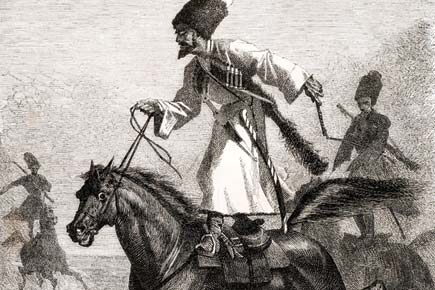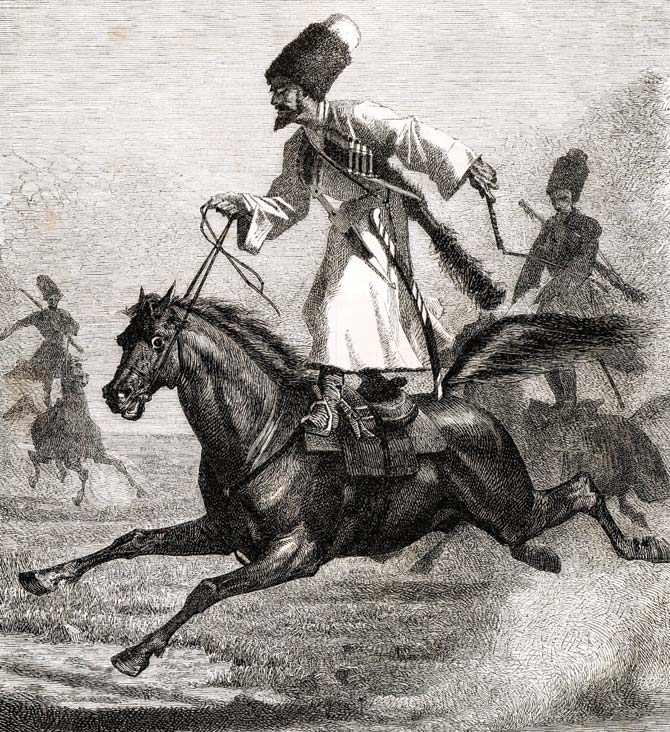My mother was fond of reading books. Or maybe I should say she was fond of reading

 My mother was fond of reading books. Or maybe I should say she was fond of reading. Till the last day of her life (she died all of a sudden, giving no sign of failing health) she would read newspapers and magazines and books cover to cover. I guess it was her love for the printed word that made her take up, for a short while, the job of an assistant librarian at Miranda House. This was in the early-1960s.
My mother was fond of reading books. Or maybe I should say she was fond of reading. Till the last day of her life (she died all of a sudden, giving no sign of failing health) she would read newspapers and magazines and books cover to cover. I guess it was her love for the printed word that made her take up, for a short while, the job of an assistant librarian at Miranda House. This was in the early-1960s.

A sketch showing Cossack horsemen galloping. Pic/Thinkstock
My early memories of ma are about all the books she bought me as a child. Books were replaced by LPs, but that was much later. Those days Soviet books were a rage. They would be lavishly illustrated and come in bright covers. I had a sizeable collection of them, mostly books of folktales from various regions of the USSR. That’s how I developed my abiding love for folktales.
Those books are long gone, tattered, torn and dumped as we shifted homes, changed cities and relocated in foreign shores, and then packed up to return to India. But my love for folktales remains as strong as ever. For, there’s something eternal about folktales. No matter how old they are or how often they are retold, they still remain as relevant as they were when they were first told.
What is most enduring about folktales is that they are neither culture nor society specific. The stories of Panchatantra are an example of how the wisdom contained in folktales is not limited to national borders or linguistic identities, and transcends cultural barriers.
We may believe that folktales belong to the past and are irrelevant for our times. But it’s amazing how they reflect contemporary mores irrespective of their vintage. For instance, there’s a Cossack folktale I have often recounted because it helps explain attitudes and concerns of our times. It is as relevant today as it was when first told. So here’s the story, marginally garnished, told all over again.
A young Cossack, who was a gifted horseman, dreamed of owning the best stallion in the village where he lived. So he toiled and saved money to buy his dream horse, and eagerly waited for the annual animal fair that was held in a nearby village. At last, the big day came and our young Cossack set off for the fair, dressed in his Sunday best.
He inspected all the horses on sale and finally found a stallion with a flowing mane, flaring nostrils, rippling muscles and glistening white fleece. This was the horse he had dreamt of and toiled for! The owner asked for a huge sum, our young Cossack paid the money without even bothering to haggle over the price. It was worth every rouble that was demanded and paid.
Horse bought, the proud new owner mounted his steed and cantered home. He rode straight to the village square where his fellow Cossacks would gather every Sunday evening for raucous drunken revelry, dismounted and called them over to show off his new horse. A collective gasp was heard as the Cossacks gathered around: None had seen a more handsome stallion than this.
One of them patted the horse and praised his strength; another counted his teeth and declared he couldn’t be more than a year old; a third ran his fingers through the mane and sighed. Women, young and old, clasped their hands and giggled; many eyed the young Cossack as a potential son-in-law or husband. A horse like that had made our man more than dashing.
The village elder was so impressed that he declared the stallion the official stud of the village horse collective and ordered a fresh round of vodka for everybody. A resounding cheer went up.
Then along came the village cynic, who was also the local correspondent of Pravda and the designated Cossack ‘intellectual’. He walked around the horse, went back to where he had been sitting sipping vodka, struck a pose similar to Rodin’s Thinker, got up after a while, walked back to the horse, lifted its tail, sniffed and declared, in a stentorian voice similar to that in which judges give their final verdict, in a scathing tone similar to that in which pompous opeds are written, “The horse stinks.”
Thank you Mr Aamir Khan for your view of India. It’s a free country and you are entitled to it.
The writer is a senior journalist based in the National Capital Region. His Twitter handle is @KanchanGupta
 Subscribe today by clicking the link and stay updated with the latest news!" Click here!
Subscribe today by clicking the link and stay updated with the latest news!" Click here!









